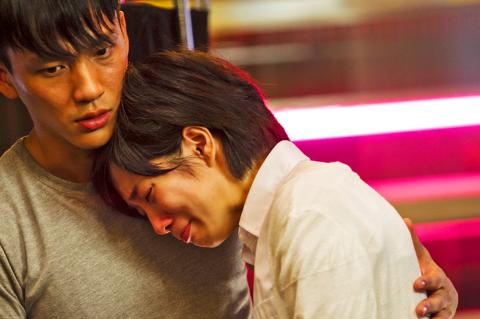Taipei’s rocketing real estate prices and growing wealth gap occupy a central place in Love in Vain (獨一無二), Alex Yang’s (楊順清) first feature film in 10 years.
The drama explores the difficulties faced by younger generations in the money-driven metropolis of Taipei. The story is actually more audience-friendly than it sounds, but the less-than-perfect execution renders the film mediocre.
The film opens with a business tycoon, played by acclaimed actor Chin Shih-chieh (金士傑), and his subordinate urinating in the pool of a luxury apartment. They rave about a big investment in China, while several young women carouse in a nearby suite. The first five minutes of the film effectively introduces the world we are about to enter, in which houses are not built for living but making a profit, and where vileness and depravity lurk beneath the glitz.

Photo courtesy of Good Day Films
Then things get a bit messy, moving on two parallel plots. Both feature newcomer Yen Tsao (曹晏豪), who plays two characters that look alike but lead completely different lives. A-yan is an innocent country boy trying to make it in Taipei, while the cynical and manipulative Xiao Yu runs a modeling agency and thirsts for celebrity.
The fates of the two strangers intertwine, evolving into a modern allegory of corruption and moral confusion in contemporary Taiwanese society.
In 1991, Yang co-wrote Edward Yang’s (楊德昌) A Brighter Summer Day (牯嶺街少年殺人事件), and has since been known for his cinematic commentary on how Taiwan’s changing society impacts its urban residents. Like his award-winning Taipei 21 (台北二 一) in 2004, Love in Vain contains plenty of sharp observations and social criticism. A-yan’s Taipei residence, for example, is merely an empty, temporary space which is later sold as a piece of premium real estate.
But such moments of insight are rare and often overshadowed by the prosaic, uneven narration.
The character studies remain largely superficial, and the criticism is cursory and sketchy.J.C. Lei’s (雷婕熙) performance is an example of how the inexperienced leads do not have the strength and experience to carry out the emotional and narrative weight. It is almost embarrassing to watch her overact her role as a sultry young woman, while awkwardly delivering pretentious lines.
While Tsao and Lei struggle, accomplished veterans such as Chin and Leon Dai (戴立忍) handle their supporting roles with ease and charm. There is no balance in between.
In the end, Love in Vain does not live up to its ambition. And to film buffs familiar the director’s works since his Edward Yang days, prepare to be disappointed.

On April 26, The Lancet published a letter from two doctors at Taichung-based China Medical University Hospital (CMUH) warning that “Taiwan’s Health Care System is on the Brink of Collapse.” The authors said that “Years of policy inaction and mismanagement of resources have led to the National Health Insurance system operating under unsustainable conditions.” The pushback was immediate. Errors in the paper were quickly identified and publicized, to discredit the authors (the hospital apologized). CNA reported that CMUH said the letter described Taiwan in 2021 as having 62 nurses per 10,000 people, when the correct number was 78 nurses per 10,000

As we live longer, our risk of cognitive impairment is increasing. How can we delay the onset of symptoms? Do we have to give up every indulgence or can small changes make a difference? We asked neurologists for tips on how to keep our brains healthy for life. TAKE CARE OF YOUR HEALTH “All of the sensible things that apply to bodily health apply to brain health,” says Suzanne O’Sullivan, a consultant in neurology at the National Hospital for Neurology and Neurosurgery in London, and the author of The Age of Diagnosis. “When you’re 20, you can get away with absolute

May 5 to May 11 What started out as friction between Taiwanese students at Taichung First High School and a Japanese head cook escalated dramatically over the first two weeks of May 1927. It began on April 30 when the cook’s wife knew that lotus starch used in that night’s dinner had rat feces in it, but failed to inform staff until the meal was already prepared. The students believed that her silence was intentional, and filed a complaint. The school’s Japanese administrators sided with the cook’s family, dismissing the students as troublemakers and clamping down on their freedoms — with

As Donald Trump’s executive order in March led to the shuttering of Voice of America (VOA) — the global broadcaster whose roots date back to the fight against Nazi propaganda — he quickly attracted support from figures not used to aligning themselves with any US administration. Trump had ordered the US Agency for Global Media, the federal agency that funds VOA and other groups promoting independent journalism overseas, to be “eliminated to the maximum extent consistent with applicable law.” The decision suddenly halted programming in 49 languages to more than 425 million people. In Moscow, Margarita Simonyan, the hardline editor-in-chief of the